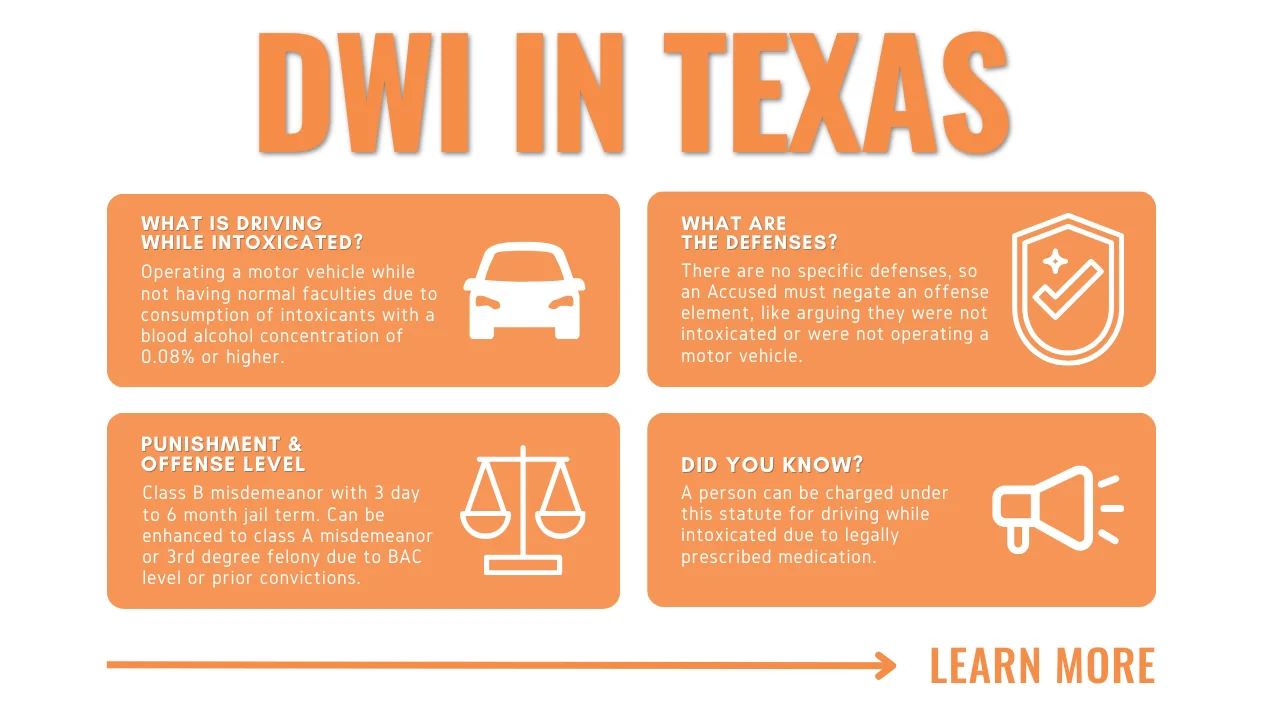A DWI first offense in Texas has severe financial, legal, and professional consequences. In this article, we will explore all of the major facts you need to know about a driving while intoxicated 1st offense charge in Texas. If the Texas government is working to convict you of a DWI first offense, keep reading to make sure you know all of the vital facts needed to start building your defense and fighting back!
- Texas law mandates a minimum jail sentence of 72 hours for a first DWI offense, with probation as an alternative under strict conditions.
- A DWI first offense immediately results in a driver’s license suspension for refusal of the Texas Implied Consent law or failure due to an illegal blood alcohol concentration.
- Judges impose strict conditions of bond requiring ignition interlock devices, zero tolerance for alcohol, and drug testing.
- DWI charges can be challenged and beaten in Texas. You can’t win if you don’t fight.

Legal Definition of DWI In Texas
What is DWI in Texas Penal Code?
The definition of DWI in the Texas Penal Code is described in Section 49.04:
Sec. 49.04. DRIVING WHILE INTOXICATED. (a) A person commits an offense if the person is intoxicated while operating a motor vehicle in a public place.
(b) Except as provided by Subsections (c) and (d) and Section 49.09, an offense under this section is a Class B misdemeanor, with a minimum term of confinement of 72 hours.
(c) If it is shown on the trial of an offense under this section that at the time of the offense the person operating the motor vehicle had an open container of alcohol in the person’s immediate possession, the offense is a Class B misdemeanor, with a minimum term of confinement of six days.
(d) If it is shown on the trial of an offense under this section that an analysis of a specimen of the person’s blood, breath, or urine showed an alcohol concentration level of 0.15 or more at the time the analysis was performed, the offense is a Class A misdemeanor.
What is the definition of intoxicated in Texas law?
Texas Penal Code chapter 49.01 defines intoxication as not having the normal use of mental or physical faculties because of the introduction of alcohol, a controlled substance, a dangerous drug, a combination of two or more substances, or any other substance into the body OR having an alcohol concentration of 0.08 or more.
DWI first offense in Texas can be elevated from a misdemeanor to a felony if children are present as passengers or if there is an accident causing serious bodily injury or death. Learn more about felony DWI charges here.
What happens after a DWI arrest in Texas?
After being arrested for DWI first offense charge, defendants see a magistrate judge. The magistrate judge sets a bond amount, and decides whether there will be additional conditions of release. For DWI first offense cases in Texas, additional bond conditions often consist of drug testing, ignition interlock or SCRAM devices.
It is important to maintain compliance with all pretrial bond conditions while the DWI case is pending in court. DWI cases typically take months to resolve, and involve many court appearances.
How much is bail for DWI in Texas?
Bond for first-time offenders with no criminal history is typically set between $1,500.00 – $10,000.00. Defendants have the option of paying a Cash Bond or working with a bail bond company or an attorney to post a Surety Bond. Additionally, defendants that qualify may apply for a Personal Recognizance (PR) bond. PR bonds often come with extra conditions. Learn more about bail and bond for DWI cases here.
What to expect with the first DWI in Texas?
Defendants should expect delay, frustration, and being treated like you are already guilty. Judges and prosecutors are jaded in Texas courts. It is important to remain steadfast and exercise your powerful constitutional rights while forcing the prosecutors to meet their burden of proof. There are often probable cause issues with even the most routine case. It is always worth fighting a DWI charge in Texas.

What are the penalties for first-time DWI in Texas?
Under Texas law, first-time DWI charges are Class B misdemeanors, typically carrying a fine of up to $3,000 and 180 days in county jail.
However, the severity of DWI charges in Texas can vary significantly based on the circumstances, as shown in the table below.
| Offense | Classification | Penalties |
|---|---|---|
| DWI First Offense | Class B Misdemeanor |
– Fine up to $3,000 – 180 days in county jail – Permanent criminal conviction – Court-ordered classes and community service – Alcohol monitoring devices – Driver’s license suspension |
| DWI First Offense 0.15+ | Class A Misdemeanor |
– Fine up to $6,000 – 365 days in jail – Permanent criminal conviction – Court-ordered classes and community service – Alcohol monitoring devices – Driver’s license suspension |
| DWI with Open Container | Class B Misdemeanor |
– Fine up to $6,000 – 365 days in jail (6-day minimum) – Permanent criminal conviction – Court-ordered classes and community service – Alcohol monitoring devices – Driver’s license suspension |
| DWI with Child Passenger | State Jail Felony |
– Fine up to $10,000 – 24 months in Texas State Jail – Permanent criminal conviction – Convicted felon status – Court-ordered classes and community service – Alcohol monitoring devices – Driver’s license suspension |
| Intoxication Assault | Felony (3rd Degree) |
– Fine up to $10,000 – 5 to 99 years in prison – Permanent criminal conviction – Convicted felon status – Court-ordered classes and community service – Alcohol monitoring devices – Driver’s license suspension |
| DUI | Class C Misdemeanor |
– Fine up to $500 – No jail time – Permanent criminal conviction – Court-ordered classes and community service – Driver’s license suspension |
Can you lose your driver’s license for DWI first offense in Texas?
DWI convictions result in driver’s license suspensions. Additionally, at the beginning of a DWI case, the Texas Department of Public Safety (DPS) imposes a suspension through Administrative License Revocation (ALR). The ALR suspension is triggered by refusal, in violation of the Texas Implied Consent law, or by failing a blood test or breath test at the time of arrest. ALR suspensions may be contested by filing a timely request within 15 days.
- Do they take your license with a DWI in Texas? Yes, law enforcement officers sometimes confiscate driver’s licenses after DWI arrests. While suspension action from the Texas Department of Public Safety is imminent, Texans are able to request a replacement license immediately through Texas DPS online.
- Does Texas suspend licenses for DWI? Yes. Texas suspends driving privileges for motorists charged with DWI. Commercially licensed drivers face especially harsh penalties. Occupational licenses are available to all Texas drivers during periods of suspension. Learn more about Occupational licenses here.
- What to Do in Your First DWI Case? Hiring an experienced Texas DWI lawyer is the first and most important thing to do after a DWI charge in Texas. It is critical to immediately assert powerful constitutional rights, request an ALR hearing, and begin the process of discovery and disclosure pursuant to chapter 39.14 of the Texas Code of Criminal Procedure, also known as the Michael Morton Act.

How Much Does a DWI First Offense in Texas Cost?
The cost of a first-time DWI in Texas is impossible to calculate. It costs a few hundred dollars in Texas to go to court for DWI. Court costs are not the only expense, however. Legal, pretrial, probation, and insurance expenses can easily top $15,000. You cannot put a price on avoiding jail and avoiding a permanent conviction. It is always worth fighting a DWI charge in Texas.
- For students – DWI charges can negatively impact college admissions and scholarship consideration. Most college and university admissions offices request disclosure of criminal arrests and convictions for incoming students.
- For professionals – DWI charges show up on professional background checks for work and security clearances. DWI charges can prohibit professional development from the military to fields requiring professional licenses like nurses, teachers, and financial professionals.
Can a DWI First Offense be Dismissed in Texas?
DWI 1st charges can be dismissed by challenging the State’s evidence. Prosecutors must prove every element of the Driving While Intoxicated charges beyond a reasonable doubt in order to meet the legal burden of proof. Challenging the traffic stop, probable cause interpretations from field sobriety tests, and the accuracy of breath testing and blood testing is a critical and important part of getting a first-offense DWI dismissed in Texas.
Can a DWI in Texas be reduced?
- Yes – it is possible to reduce a Class A misdemeanor DWI to a Class B misdemeanor DWI by challenging the accuracy of the breath or blood test. It is always worth fighting a DWI in Texas.
Can you get deferred on a DWI in Texas?
- Yes – Deferred Adjudication is a possible legal outcome for Texans facing first-time DWI charges. There are strict qualifications for Deferred Adjudication. Deferred Adjudication is a way to do probation while still avoiding a final conviction. Read more about Deferred Adjudication for DWI in Texas.
What is the best outcome for first-time DWI in Texas?
- Dismissal is the best outcome for all first-time DWI charges. You can’t win if you don’t fight. Learn how to beat a DWI charge in Texas.
How Do I Get My DWI First Offense Charge Dismissed in Texas?
Hiring experienced Texas DWI lawyers with a track record of success in the single best way to get a DWI first offense dismissed. Chances of DWI dismissal for first-time offenders are significantly increased by having competent counsel to request, review, and challenge evidence. Even tough cases can be won.
How can an attorney help me with my first DWI in Texas?
A top-rated DWI attorney can level the playing field in a DWI case. The best DWI lawyers work to shield clients from the harmful professional and personal consequences of a criminal prosecution. Three important things DWI attorneys do for clients in every case:
- Texas DWI lawyers make legal arguments to the judge to exclude certain evidence which can result in reductions and dismissed charges.
- Texas DWI lawyers investigate witnesses to be sure they are trustworthy, discovering and exploiting any instances of misconduct or bias.
- Texas DWI lawyers can expertly apply and explain the law and legal process so clients make the best and most informed decisions for their case, their families, and the future.
The advocates at Trey Porter Law have over 40 years of combined experience in every facet of criminal law. Trey Porter Law has a reputation for getting great results in the toughest situations. The team at Trey Porter Law is committed to obtaining the best outcome in every case, every time, while working diligently to protect clients’ livelihoods and preserve their quality of life.
Can you get probation for first DWI offense in Texas?
Yes – probation is possible for every person charged with DWI in Texas. However, the ultimate decision on probation is always up to a judge or jury. There is never a guarantee of probation for DWI 1st in Texas.
- How long is probation for first-time DWI in Texas? The maximum period of probation for DWI first-offense is 24 months in Texas. Judges have full discretion over probation and can modify the term and conditions at any time.
How long does a DWI first offense stay on your criminal record?
Forever. DWI first offense charges stay on the record forever in Texas. Even if the case was closed and there’s no conviction, the records of the arrest and prosecution remain forever. Some DWI cases can be sealed through a nondisclosure or deleted altogether through the powerful process of expungement.

Get Help With Your DWI First Offense Today
The stakes are high in DWI cases. Every person facing a DWI 1st charge in Texas is facing jail time, loss of income, and permanent personal and professional consequences. Trey Porter Law is an award-winning, perennially recognized defense firm with over 40 years of combined courtroom experience. TPL has a hard-earned reputation of winning dismissals for Texans facing DWI charges. Start your defense today.













